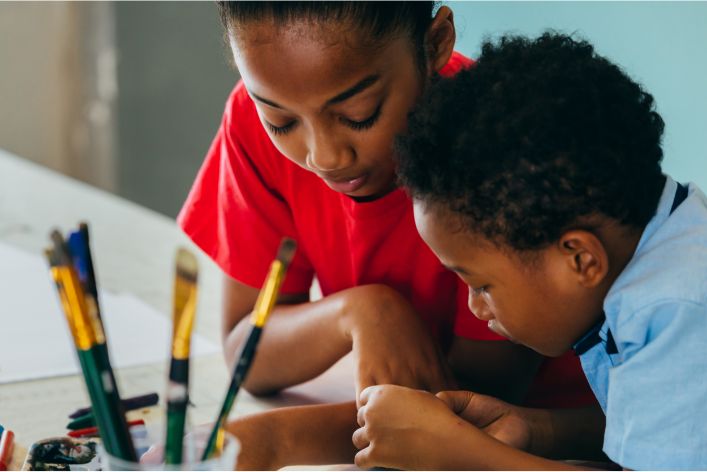Introduction
The cultural impact on child development is significant as it influences a child’s beliefs, values, and behaviors. Culture plays a vital role in shaping a child’s identity, personality, and social interactions.
Child development is the process by which a child grows physically, mentally, and emotionally. It is crucial for a child to develop optimally in order to become a healthy and productive adult.
Nigeria’s culture is diverse and rich with traditions, customs, and beliefs that influence child development. In Nigeria, children are seen as the future of the country and their development is highly valued. Parents take an active role in child-rearing, providing guidance, support, and discipline.
The importance of cultural impact on child development in Nigeria cannot be overemphasized. It influences a child’s language development, socialization, and cognitive skills. Exposure to cultural heritage increases the likelihood of children developing a strong sense of identity and self-esteem.
They are also more likely to be respectful of their cultural norms and values. Therefore, understanding and appreciating the cultural impact on child development in Nigeria is essential for parents, caregivers, and educators.
It helps to create an environment that nurtures a child’s growth and development, while also preserving the rich cultural heritage of Nigeria.
Historical/Background Context
Overview of Nigeria’s History and how it Has Shaped its Cultural Practices
- Nigeria, the most populous country in Africa, gained independence from British colonial rule in 1960.
- The country has a rich cultural heritage that has evolved over time through various civilizations and empires.
- Nigeria’s cultural practices are diverse and vary significantly across the various ethnic groups in the country.
- Traditional parenting styles in Nigeria are largely influenced by cultural and religious beliefs.
- Traditional Nigerian societies view parenting as a shared responsibility, with extended family members and community members actively participating in child rearing.
- Parents emphasize respect for authority, hard work, and the importance of education in their children’s upbringing.
- Western culture has had a significant impact on Nigeria’s child rearing practices.
- The introduction of Western education and the influence of Western media have led to changes in parenting styles.
- Western cultural values such as individualism, self-expression, and gender equality are gradually finding their way into Nigerian parenting practices.
- Urbanization and the growing middle class have also contributed to changes in child-rearing practices.
Nigeria’s cultural practices have deep roots in its history, evolving over centuries through various civilizations and empires.
Although Nigeria gained independence from British colonial rule, British colonialism had a significant impact on Nigeria’s culture, including its parenting styles.
Traditional Parenting Styles in Nigeria
Cultural and religious beliefs heavily influence traditional Nigerian parenting styles. In these societies, extended family and community members actively share the responsibilities of child rearing, considering it a communal duty. Parents emphasize respect for authority, hard work, and the importance of education in their children’s upbringing.
Introduction and Impact of Western Culture on Child Rearing Practices in Nigeria
The introduction of Western culture and Western education has had a significant impact on Nigeria’s child-rearing practices. Many Nigerian parents are now incorporating Western parenting practices into their child rearing, including emphasis on individualism and gender equality.
Some Nigerian parents are also becoming more permissive in their child rearing styles, with less emphasis on respect for authority and more emphasis on self-expression.
Increasing urbanization and the growth of the middle class have also contributed to changes in child-rearing practices.
More Nigerian parents are now living in urban areas and have access to Western media, which has further influenced their child-rearing practices. There is now a growing trend among Nigerian parents to send their children to Western-style schools and to adopt Western-style parenting practices.
Therefore, Nigeria’s cultural practices have evolved over centuries through various civilizations and empires. Traditional Nigerian parenting styles have deep roots in cultural and religious beliefs, emphasizing respect for authority, hard work, and the value of education.
However, the introduction of Western culture and Western education has led to changes in child-rearing practices in Nigeria, with more parents adopting Western-style parenting practices. These changes are also accelerated by increasing urbanization and the growth of the middle class.
Parenting Made Just for You
Get personalized Parenting Solutions tailored to your child’s needs. Transform your parenting journey with expert guidance in 1-3 days.
Get StartedRead: Expectations vs Reality: Child Milestones in Nigeria
Parenting Influences in Nigerian Culture
Nigeria is known for its diverse cultural practices. These cultural practices have significant impacts on child development. Nigerian parents, especially those from rural areas, rely heavily on extended family and community for parenting.
The community, in this case, includes neighbors and family members who share similar values and beliefs. This communal parenting provides a strong sense of support, guidance, and a shared responsibility towards the child’s growth and development.
Religious Beliefs and Practices and their Impact on Child Development
Religious beliefs and practices have a significant impact on Nigerian child development. Nigeria is predominantly a religious country, with Christianity and Islam being the widely practiced religions. Religious beliefs influence the behavior of parents towards their children.
They help to shape the child’s values and morals. For instance, Christianity believes in gentle parenting, while Islam emphasizes on obedience and good manners towards parents. Religious teachings have an impact on other areas such as decision-making, discipline, and overall upbringing.
Gender Roles and their Impact on Child Development in Nigeria
Gender roles and their impact on child development in Nigeria cannot be overemphasized. The Nigerian society has specific gender-based roles and expectations. Male children are expected to be strong, independent, and always lead.
On the other hand, female children are expected to be nurturing, obedient, and submissive. These expectations influence the manner in which parents raise their children.
In Nigerian culture, boys may face restrictions on expressing vulnerability, crying, or participating in household chores. Conversely, girls are expected to engage in house chores from an early age, among other responsibilities.
These gender roles affect the child’s identity and their understanding of what is expected of them in society.
Educational Practices and School Influences on Child Development in Nigeria
Educational practices and school influences also play a crucial role in child development in Nigeria. Schools, especially those in urban areas, play an important role in shaping the child’s values and morals.
The Nigerian curriculum emphasizes essential values in Nigerian society, such as discipline, obedience, and respect for authority.
However, these values have been criticized for stifling creativity and independent thinking in children.
In essence, parenting in Nigerian culture reflects diverse influences, including the role of extended family and community, religious beliefs, gender roles, and educational practices. These factors shape the child’s identity, values, and beliefs, which in turn have implications for their socialization into the Nigerian society.
Understanding these cultural influences and their effects on child development is crucial for parents, caregivers, and educators who work with Nigerian children.
Unveil the Perfect Name that Tells Your Family's Story
Let us help you find a name that embodies your family's values, traditions, and dreams. Our personalized consultation weaves cultural insights to create a name that's uniquely yours.
Get StartedRead: A Nigerian Parent’s Handbook: Child Development Milestones

Nutrition and Health in Nigerian Culture
Cultural practices have a significant impact on child development in Nigeria, especially in the area of nutrition and health. Nigeria is a diverse country with over 250 ethnic groups, each with unique cultural beliefs and practices.
These cultural practices, including food practices, can have both positive and negative effects on a child’s nutrition and health.
The Role of Cultural Food Practices in Child Nutrition and Health
Food practices are an integral part of Nigerian culture, and many traditional Nigerian dishes are highly nutritious. However, some cultural food practices can result in poor nutrition and health outcomes for children.
For example, some cultural beliefs encourage the use of herbal medicines and traditional dietary practices, which may limit access to critical micronutrients such as iron, zinc, and vitamin A.
Furthermore, some cultural beliefs may encourage overfeeding or underfeeding of children. In certain Nigerian cultures, the belief persists that a fat baby signifies good health, causing some mothers to overfeed their children. This can lead to childhood obesity and other health complications.
Traditional Medicine and its Impact on Child Health in Nigeria
Nigeria has practiced traditional medicine for centuries, and it remains prevalent, particularly in rural communities. The use of traditional medicine can impact child health positively or negatively. Traditional medicine can provide an accessible and affordable alternative to western medicine, especially for families living in poverty.
However, the lack of regulation and standardization of traditional medicine can be harmful to child health.
The use of traditional medicine can result in misdiagnosis and treatment delays, leading to poor health outcomes. It is essential to harmonize traditional medicine practices with western medicine to ensure the efficacy and safety of traditional medicines for children.
Western Medicine in Nigeria and Influence on Child Health
Nigeria has widely adopted Western medicine, leading to significant improvements in child health outcomes. Western medicine practices, such as immunization and prenatal care, have been successful in eradicating infectious diseases such as polio and measles.
However, some western medicine practices may clash with cultural beliefs, limiting their adoption by some Nigerian families.
Healthcare providers need to understand the role of culture in influencing health and nutrition practices and tailor healthcare delivery to meet the needs of individual communities.
Including cultural beliefs and practices in healthcare delivery promotes collaboration and encourages positive interactions between healthcare providers and families.
In fact, cultural practices significantly impact child development in Nigeria, especially in the areas of nutrition and health. Understanding the role of cultural practices in child health is essential for healthcare providers to promote positive experiences, reduce stigmatization, and improve health outcomes.
The integration of both traditional and western medicine practices provides a holistic approach to child health care in Nigeria.
Read: Parenting in Nigeria: Tracking the Progress of Your Child
Challenges and Opportunities
Common Challenges Faced in Child Development in Nigeria
Child development is a critical aspect of modern society and a concern for many parents, guardians, and policymakers. However, child development in Nigeria faces several challenges, including poverty, illiteracy, and cultural barriers.
One of the most significant challenges in child development in Nigeria is poverty. Many families struggle to provide basic necessities like food, shelter, and healthcare to their children, which affects their cognitive and physical growth. Poverty also leads to inadequate education and exposure to harmful practices like child labor.
Another challenge is illiteracy, which affects the quality of education and parental involvement in child development. Parents who cannot read or write may not understand the importance of early childhood development, leading to neglect or inadequate care.
Moreover, they may not actively participate in their children’s schooling or provide academic support.
Cultural barriers pose another significant challenge to child development in Nigeria. Nigeria is a multi-ethnic and multi-religious country, with diverse cultural practices that vary across regions and communities.
These cultural practices shape the beliefs and attitudes of parents and caregivers towards child development, influencing decisions on child-rearing practices, education, and health.
For instance, some cultural practices promote early marriage for girls, preventing them from acquiring education or pursuing a career.
Opportunities for Improvement and Progress
Despite these challenges, Nigeria has several opportunities to improve and progress in child development. The National Policy on Education recognizes early childhood care and education as a fundamental objective of education, and the government has implemented several initiatives to promote child development, like the Universal Basic Education program, the Midwives Service Scheme and the Sustainable Development Goals.
Furthermore, Nigeria’s rich cultural diversity offers opportunities for promoting cultural integration while maintaining cultural traditions in child development.
Parents and caregivers can integrate cultural practices that support child growth and development, like storytelling, traditional games, and songs, while discarding harmful practices like child marriage and female genital mutilation.
This approach creates a sense of cultural pride and identity while promoting children’s cognitive, socio-emotional, and physical development.
Ways to Promote Cultural Integration while Maintaining Cultural Traditions in Child Development
Several ways can promote cultural integration while maintaining cultural traditions in child development in Nigeria.
First, community education programs can raise awareness and educate parents and caregivers on the importance of early childhood development, including the benefits of integrating cultural practices.
Second, schools can incorporate cultural education into the curriculum, teaching children about their culture and heritage while instilling values of respect and tolerance for other cultures.
On a final note, Child development in Nigeria is fraught with challenges, but it also offers opportunities for improvement and progress. Addressing poverty, illiteracy, and cultural barriers is critical to creating an environment that supports children’s growth and development in Nigeria.
Additionally, promoting cultural integration while maintaining cultural traditions can create a rich cultural context for child development, supporting cognitive, socio-emotional, and physical growth, while preserving Nigeria’s cultural heritage.
Read: Child Development in Nigeria: Age-by-Age Milestone Guide
Conclusion
In a nutshell, the cultural impact on child development in Nigeria cannot be underestimated. It plays a significant role in shaping the physical, emotional, and cognitive development of children in the country.
As a nation with diverse cultural backgrounds, it is crucial to recognize and promote culturally responsive practices in childcare and education.
It is important to emphasize the need for parents, caregivers, and educators to be aware of the influence of culture on a child’s development. This knowledge can enable them to provide appropriate support and interventions that meet the child’s cultural needs.
We must also understand that cultural practices evolve, and some may have negative effects on children’s development.
Therefore, it is necessary to engage in conversations that challenge harmful cultural practices and promote positive aspects. This way, we can ensure that Nigerian children grow up in a culturally supportive environment.
A call to action is necessary to promote and support culturally responsive practices for the lifelong well-being of Nigerian children.
Partnerships between the government and non-governmental organizations can develop programs that cater to children’s cultural well-being.
Training childcare providers and educators on culturally responsive practices ensures equal opportunities for all children to thrive, regardless of their cultural background.
We must recognize that the cultural impact on child development in Nigeria tells a unique story and is an essential aspect of the country’s collective identity.
Embracing cultural diversity and promoting cultural sensitivity positively impacts not just the children, but also helps to shape a more inclusive, cohesive, and prosperous Nigeria.




